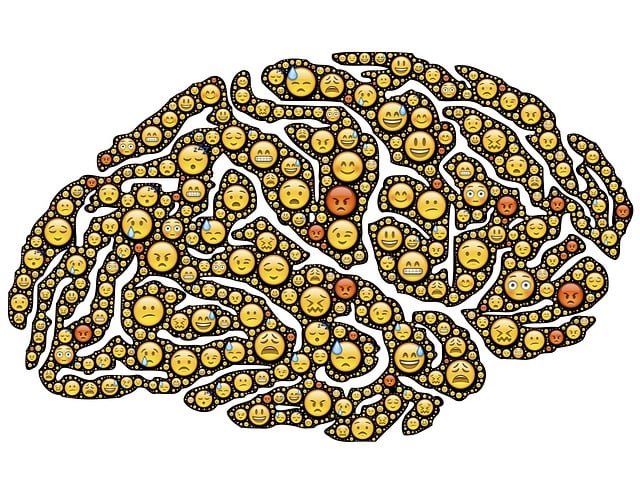In today's fast-paced world, the demand for mental wellness support is at an all-time high. Traditional symptom-focused approaches are complemented by preventive measures like Mental Wellness Coaching Programs, pioneered by centers such as Boulder Psychological Testing Therapy. These programs foster resilience and emotional well-being through practices like Compassion Cultivation and Emotional Intelligence. By offering tailored coaching sessions, they help individuals manage stress, cultivate self-compassion, and improve emotional intelligence—essential for mental health. Organizations are investing in these programs to create supportive environments for employees' personal and professional growth. Boulder Psychological Testing Therapy emphasizes evidence-based assessments, personalized coaching strategies, and a robust curriculum that includes role-playing, mindfulness training, and group discussions. Success is measured through multi-faceted evaluations, with continuous improvement based on data, ensuring the program remains relevant, effective, and aligned with best practices.
In today’s fast-paced world, mental wellness coaching programs have emerged as vital tools for fostering resilience and enhancing overall well-being. This article explores the development of comprehensive coaching curricula that integrate Boulder Psychological Testing Therapy techniques, catering to a diverse range of individuals seeking support. We delve into understanding the growing need for such programs, designing effective therapy integration strategies, and implementing evaluation methods to ensure continuous improvement.
- Understanding the Need for Mental Wellness Coaching Programs
- Designing Effective Boulder Psychological Testing Therapy Integration
- Implementing and Delivering a Comprehensive Coaching Curriculum
- Measuring Success: Evaluation and Continuous Improvement Strategies
Understanding the Need for Mental Wellness Coaching Programs

In today’s fast-paced world, the demand for comprehensive mental wellness support has never been higher. The traditional approach to psychological well-being often focuses on treating symptoms after they emerge, but preventive measures are equally vital. This is where Mental Wellness Coaching Programs step in as a transformative game-changer. These programs recognize that fostering resilience and emotional well-being is crucial for navigating life’s challenges effectively. By integrating practices like Compassion Cultivation and Emotional Intelligence, coaches empower individuals to develop coping strategies that enhance their overall mental wellness.
Boulder Psychological Testing Therapy centers have been at the forefront of this movement, offering tailored coaching sessions that address the unique needs of each client. These programs are designed to help individuals manage stress, cultivate self-compassion, and improve emotional intelligence—all essential components for maintaining a healthy mind. With the increasing recognition of mental health as a priority, organizations are now more inclined to invest in such initiatives, creating a supportive environment where employees can thrive both personally and professionally.
Designing Effective Boulder Psychological Testing Therapy Integration

In designing effective Boulder Psychological Testing Therapy integration for mental wellness coaching programs, it’s crucial to leverage evidence-based assessments tailored to individual needs. These tests should encompass a comprehensive range of psychological dimensions, including emotional regulation, stress management, and other relevant factors that contribute to overall mental health. By integrating the results of these evaluations into personalized coaching strategies, practitioners can deliver targeted interventions.
This approach ensures that Boulder Psychological Testing Therapy becomes an integral part of a holistic mental wellness program. Coaches can then facilitate meaningful discussions around test findings, empowering individuals to understand their emotional landscapes better and adopt healthier coping mechanisms. In light of this integration, Mental Health Policy Analysis and Advocacy plays a vital role in ensuring accessibility and quality standards for such services, ultimately fostering improved Emotional Regulation and Stress Management among participants.
Implementing and Delivering a Comprehensive Coaching Curriculum

Implementing a comprehensive coaching curriculum is a meticulous process that forms the backbone of an effective mental wellness coaching program. This involves carefully curating a structured framework encompassing various aspects of psychological well-being, such as self-awareness exercises, stress management techniques, and emotional intelligence development. The curriculum should be designed to cater to diverse individual needs, ensuring flexibility while adhering to evidence-based practices.
In the context of Boulder Psychological Testing & Therapy, the delivery of this curriculum can be tailored to suit different platforms, whether it’s in-person workshops, online sessions, or community outreach programs. Incorporating elements like role-playing exercises, mindfulness training, and group discussions not only enhances learning but also fosters a sense of support among participants. Furthermore, integrating Public Awareness Campaigns Development and Mental Health Policy Analysis and Advocacy into the curriculum can help broaden perspectives and empower individuals to become advocates for their own mental health, contributing to a more holistic approach to community well-being.
Measuring Success: Evaluation and Continuous Improvement Strategies

Measuring success is a pivotal aspect of developing effective mental wellness coaching programs. It involves a multifaceted approach that goes beyond mere participant satisfaction. Professionals in this field should employ robust evaluation methods, such as Boulder Psychological Testing and Therapy tools, to assess tangible improvements in mental health outcomes. This includes tracking reductions in symptoms of anxiety and depression, increased resilience, enhanced emotional intelligence, and improved overall well-being.
Continuous improvement is equally crucial. Using data from evaluations, coaches can refine program design, ensuring that Mental Health Education Programs are tailored to meet the evolving needs of participants. Regularly updating curriculum content based on emerging research in mental wellness and emotional intelligence ensures that the programs remain relevant, effective, and aligned with best practices.
Mental wellness coaching programs are evolving to meet the growing demand for holistic mental health support. By integrating Boulder Psychological Testing Therapy into a comprehensive curriculum, these programs can effectively address individual needs. Through careful design, implementation, and continuous improvement, we can ensure that coaching initiatives not only measure success but also foster long-lasting positive outcomes for participants. Embracing evidence-based practices, such as Boulder Psychological Testing, is key to revolutionizing mental wellness coaching and making it accessible to all.













